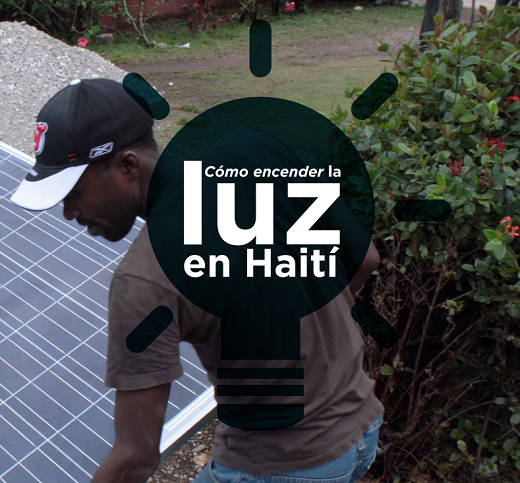“How to turn on the light in Haiti” (available in Spanish) tells the story of a successful rural electrification program in Haiti, a program that could be implemented in other rural areas of Latin America and the Caribbean.
On January 12, 2010, Haiti suffered one of the worst natural disasters in its history: a 7.0 earthquake on the Richter scale that shook the country and resulted in more than 200,000 casulties.
The earthquake had devastating effects on infrastructure and services that already had certain shortcomings: it caused a partial or total collapse of government buildings such as the Presidential Palace and the main public hospital in the capital; it disabled roads, ports and the main airport; it razed many poor neighborhoods and thousands of residential buildings; it caused serious damage to water, electricity and transportation services, and the public health system collapsed. Before the earthquake, many hospitals and clinics did not have basic services such as electricity. The tragedy aggravated this situation.
In the aftermath of the earthquake in 2010, the Inter-American Development Bank teamed up with the Global Environment Facility (GEF) and the World Bank to create a fund to provide electricity to Haiti during the crisis. Each institution made a contribution of one million dollars. Between 2011 and 2013, the IDB was responsible for the implementation of half of that fund and acquired, installed and operated photovoltaic systems – systems that convert solar energy into electricity.
The IDB provided the necessary technical assistance to develop electrification projects in rural clinics and refugee camps.
The resources of the first component of the program were allocated to purchase and install 100 solar lamps in two refugee camps in Port-au-Prince (63 lamps at Caradeux Fieldand and 77 at Petionville Field). Before installing the lamps, sexual assaults on women were frequent. They occurred mainly at night when the victims went to the bathroom in the dark. The problem was so serious that some women preferred to go to the bathroom where they slept so as not to be exposed to danger. The lamps reduced the number of sexual assaults and insecurity in general.
The funds from the second component were used to purchase photovoltaic systems and install them in 12 health centers in the southern region of the country. The beneficiary populations were: Chantal, Saint Jean, Tiburon, Chardonnieres, Les Anglais, Port-à-Piment, Damassin, Coteaux, Roche-à-Bateaux, Cote de Fer, and Ile-à-Vache and Randel. The benefits of the health centers were immediately evident given that the solar panels provided energy for health services in the evening, as well as emergency services and improved maternity health. Patients now have access to laboratories and other advanced services, as well as, in some cases, electronic patient databases.
The implementation of this solar energy program has opened new avenues of action in Haiti. By providing electricity to refugee camps and clinics via solar power, it has proved that the model is successful and replicable in other small communities in the region. In fact, similar initiatives could help expand the Haiti’s electricity coverage. Unfortunately in 2016 Hurricane Thomas caused great destruction to the solar energy program, as can be seen in the following video.


Leave a Reply